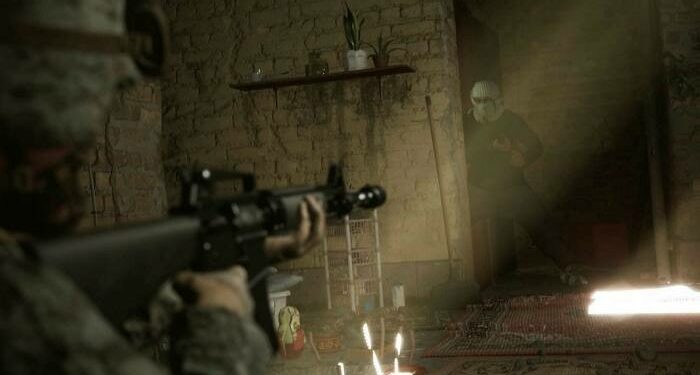Down a dark staircase in the Basateen neighbourhood of Cairo is a gaming café called 7. Inside, the lights are low, so I can only make out smoky silhouettes of young men playing billiards, darts and ping pong. A waiter ushers my friends and me into a dark booth with squashy sofas in front of a widescreen TV, where we order food and shisha and play all the video games we can handle, paying by the hour.
Cairo, like everywhere else in the world, is full of gamers. But as I watch groups in the café playing Fifa, WWE and Mortal Kombat, I consider how rarely Arab people are portrayed in these games with anything other than reductive, offensive stereotypes. Once the stock villains of war games were Nazis, but today, following 9/11 and the war on terror, they are jihadis, faceless terrorists with robes and beards that exist only to hate the west and soak up bullets.
In series such as Call of Duty, Medal of Honor and Battlefield, the Arab world is reduced to a playground of war — wastelands of rubble and sand. “We’re being used as a media shortcut for evil,” says Dutch-Egyptian game developer and advocate Rami Ismail. “[Developers] are not trying to represent our culture, they’re trying to use it as a backdrop for violence.”
The traditions and culture of the Arab world are routinely confused in games. Locals are used to seeing Iraqi characters speaking the wildly different Moroccan dialect or Saudi characters wearing traditional Egyptian clothing. Ismail contributes to a blog called “Nope, Not Arabic”, which highlights the ways the Arabic language is misrepresented, often erroneously written left to right. “It shows people don’t think of the Arab world as important,” he says. “If you wrote something backwards in English or French, somebody would notice.”
One game in particular has caused controversy like no other. Six Days in Fallujah, which depicts the experience of US marines in the bloody battle for the Iraqi city in the second Gulf war, was conceived more than a decade ago, before a public outcry led to its cancellation. It was recently revived, with developers boasting of how the game randomises the layout of Fallujah to boost replayability, turning it into a military amusement park devoid of authenticity, specificity and meaning. Amid heavy criticism, its release was recently delayed by a year in order to add more people to the development team and refine the game.
Ismail doesn’t believe that there is generally malicious intent behind the depictions. The bases of game production are still Japan, Europe and the US, and, as Edward Said argued in Orientalism, their depictions of the Arab world say more about their own cultures than about it.
This issue is not unique to gaming — in television and films we have long seen stereotyped images of the Arab world. “Pick your white hero and you can probably see them shoot Arabs in a movie somewhere,” says Ismail. Nor are reductive representations limited to Arabs. Latin America is usually invoked as a lawless tropical home for drug barons, Russia as the freezing home of vodka, KGB and Kalashnikovs.
Solving the problem of Arab stereotypes in games requires two discrete approaches. One is to fix the lack of representation in the industry by hiring Arab developers who can question stereotypes and by funding games made in the Arab world, which is slowly starting to happen. The other is trickier because it involves a wider cultural shift. “We need people to understand the Arab world is a place that has beautiful stories of love, laughter, happiness and sadness,” says Ismail, “stories that aren’t in service to a hero from the outside coming to rescue us.”
There have been signs of improvement in recent years. There are representations of Arabs in games such as Tekken, Street Fighter and Overwatch that are somewhat nuanced. The playable character of Farah in 2019’s Call of Duty: Modern Warfare (a series which was a prime offender in previous iterations) is an example of positive representation. Others, such as Layla in Assassin’s Creed and Faridah in Deus Ex, are solid heroes, yet as Arab characters who are clearly westernised, they fit another reductive stereotype: the “good Muslim”.
The conversation around Arab representation has been gaining traction in the media, which is a positive start. Earlier this year, gamers and developers raised $900,000 to support Palestine as part of a charity game drive by platform Itch.io. “There is slowly a push for better,” says Ismail, “because the games industry has started to realise that what we do matters. We are the cultural medium that defines how youth and teenagers see the world.”











